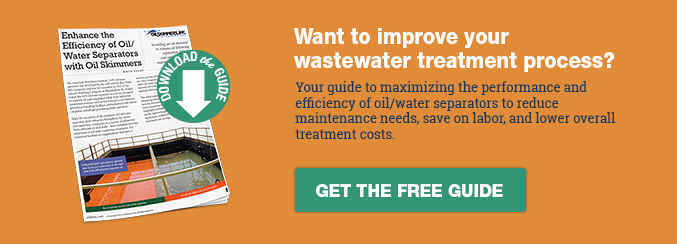
The Importance of Active Oil Removal from Oil Water Separator Systems
Removing oil from any industrial process is important. Animal fats, grease and petroleum-based oils all have a significant impact on both overall maintenance and environmental compliance of an operation.
Hence why oil refineries, chemical plants, steel mills and many other types of companies throughout the world use oil/water separators. This flow-through device takes advantage of the fact that oil has a lower density than water, causing it to float on the water’s surface, to separate oil from the wastewater.
But isolating the waste oil is only part of the wastewater treatment equation. An area where oil/water separators commonly fall short is efficient removal of the oil after the separation occurs.
This is where oil skimming comes in.
After separation, an oil skimmer will remove the layer of waste oil from the surface of the water. A quality oil skimmer can effectively remove all of the oil, keeping the separator operating efficiently and preventing the problems that residual oil can cause down the line.
What are some common issues with oil/water separators? Here are four key things you should be aware of to ensure the optimal operation of your oil water separator.
4 Variables that Impact the Performance of Your Oil Water Separator
1. Proper Oil Water Separator Design
Since the requirements of each particular oily water application are different, it is important to ensure that the oil water separator system meets the specifications.
Every oil water separator must be able to accommodate maximum flow rates and account for occasional spikes, such as excessive stormwater runoff. If these factors aren’t appropriately accounted for when the separator is designed or specified, its efficiency and operation can be significantly impaired.
2. Oil Water Separator Maintenance
To ensure that an oil/water separator continues to operate effectively, trained personnel need to frequently inspect, maintain and service the system. A lack of regular maintenance can cause mechanical failures and leaks that can result in accidental discharge of oil—defeating the purpose of the wastewater treatment system.
3. Emulsifying agents
Many industries use detergents and soaps to help remove oil from their equipment.
But while using these (or other chemicals) helps remove oily grime, they may actually cause emulsification of waste oil and hinder the operation of oil/water separators. Oil mixed with soapy wastewater, for example, takes significantly longer to separate from the water, and the efficiency of the separator takes a hit. In some cases, with excessive detergent use, waste oil can completely emulsify into the wastewater stream, and pass through the separator, rendering it ineffective.
4. Sludge build-up
Another common challenge with oil/water separators is the build-up of sludge. When particles and debris mix with oil droplets they sink to the bottom of the separator. When sludge is not regularly removed and is allowed to accumulate, the build-up can affect the separator’s performance – and if it meets certain toxicity levels, the sludge may be considered to be hazardous waste.
Maximize the Effect of Your Oil Water Separator with an Oil Skimmer
Every oil water separator needs some kind of oil removal capability or device. Check on the capability and functionality of the oil removal system on your separator. Using an oil skimmer to actively and continuously remove oil from the surface of your oil/water separator reduces the required maintenance, saves money on labor, enables easier, clearer visual inspection, prevents oil from causing issues with other treatment equipment down the line, and improves the overall wastewater treatment process.
Does your oil water separator system have a properly functioning oil skimmer?
The right oil skimming solution can improve the effectiveness of oil/water separators, reduce
costs, create new revenue streams and provide a safer
work environment. For more on how to maximize the efficiency your separator, download the
whitepaper, Enhance the Efficiency of
Oil/Water Separators with Oil Skimmers.

